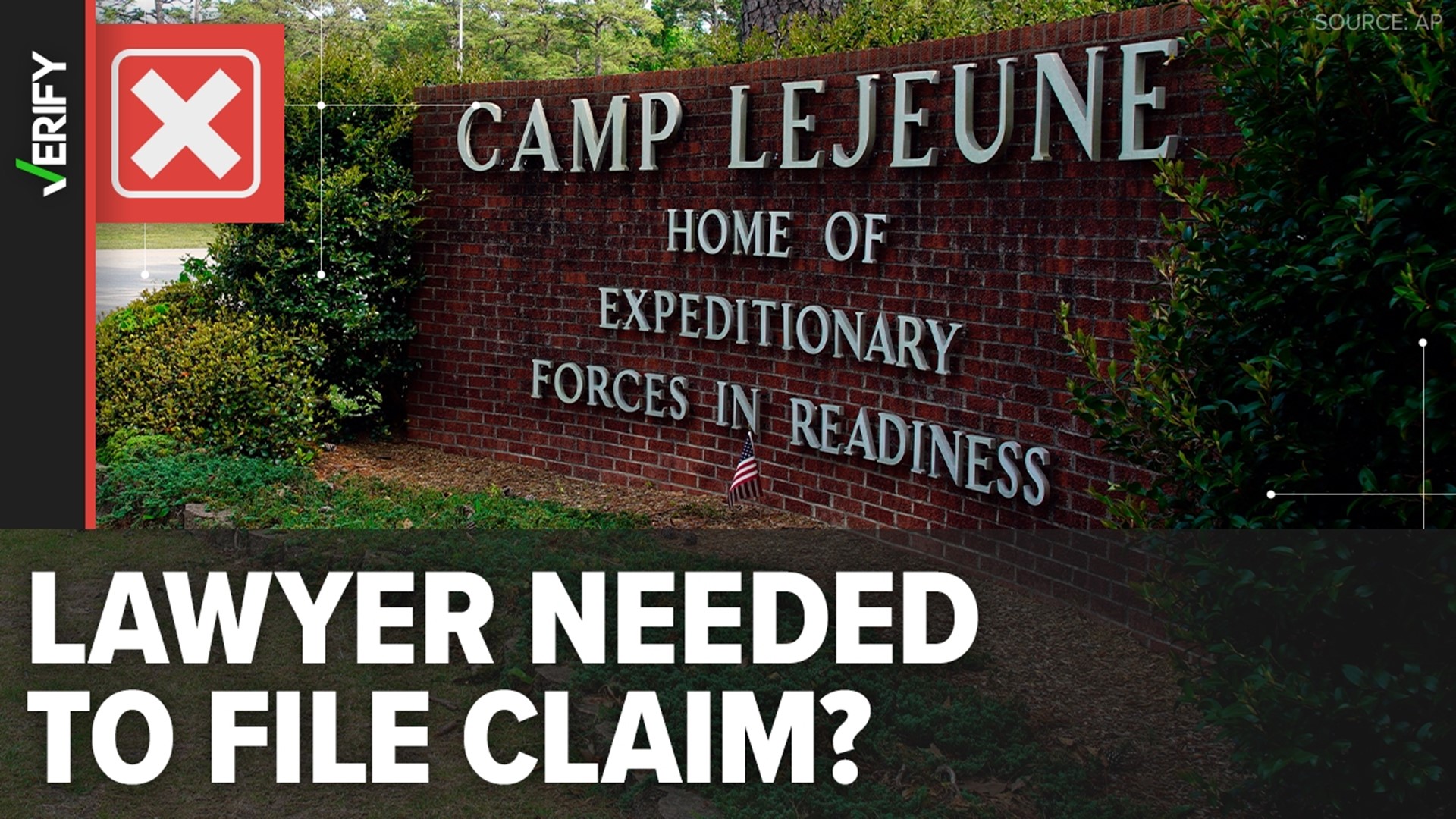Camp Lejeune is a U.S. Marine Corps base in Jacksonville, North Carolina. In the 1980s, the Marine Corps learned that some members of the military, their families and civilians were exposed to toxic chemicals in the base’s water supply from 1953 to 1987.
On Aug. 10, 2022, President Joe Biden signed the Honoring Our Promise to Address Comprehensive Toxics (PACT) Act of 2022 into law. A section in the legislation known as the Camp Lejeune Justice Act of 2022 allows individuals who were previously exposed to toxic water at Camp Lejeune to file a claim in order to seek compensation.
Multiple law firms have been offering to help people who were affected by Camp Lejeune’s toxic water get benefits. VERIFY viewer Bill wants to know if people need a lawyer to file a claim.
THE QUESTION
Do people affected by Camp Lejeune’s toxic water need a lawyer to file a claim?
THE SOURCES
- Honoring our PACT Act of 2022
- U.S. Navy
- U.S. Department of Justice
- U.S. Department of Veterans Affairs
- Marine Corps Base Camp Lejeune
- Agency for Toxic Substances and Disease Registry (ATSDR)
- Public guidance on elective option for Camp Lejeune Justice Act claims
- Bell Legal Group
- Thom Tillis, U.S. Senator for North Carolina
THE ANSWER
No, people affected by Camp Lejeune's toxic water do not need a lawyer to file a claim.
WHAT WE FOUND
Individuals who were exposed to toxic chemicals in Camp Lejeune’s water supply from 1953 to 1987 do not need a lawyer to file a claim in order to seek compensation under the Camp Lejeune Justice Act of 2022, according to the Honoring our PACT Act of 2022, the U.S. Navy and U.S. Department of Veterans Affairs (VA).
The text of the Honoring our PACT Act of 2022 states that a lawyer can file a Camp Lejuene Justice Act claim on behalf of eligible individuals, but people are also permitted to file individually — meaning they are not required to hire a lawyer to file a claim. The Navy has established a website to help people file claims on their own behalf.
According to the Navy, individuals may seek relief in federal court for a claim that is denied or if no decision is made six months after a claim is filed. In an email, the Bell Legal Group told VERIFY that although an attorney is not required to file a claim, a lawyer would be required to pursue the case in federal court.
“People will need to seek legal counsel in order to properly pursue their case in the court system,” the Bell Legal Group said.
Am I eligible to file a claim?
Camp Lejeune’s drinking water from 1953 to 1987 was found to be contaminated with industrial solvents, such as trichloroethylene (TCE) and perchloroethylene (PCE), benzene, and other harmful chemicals, including vinyl chloride, according to the Agency for Toxic Substances and Disease Registry (ASTDR), the Marine Corps and the Office of U.S. Senator Thom Tillis (R-NC). These chemicals were identified in two on-base water wells at Camp Lejeune at levels ranging from 240 to 3,400 times the levels permitted by safety standards.
Many veterans and their families have been fighting for years to receive compensation for medical conditions they claim they developed after being exposed to the toxic water at Camp Lejeune from 1953 to 1987. On Sept. 6, 2023, the Justice Department and the Navy developed a voluntary elective option to resolve claims as quickly as possible.
The elective option allows the Navy to focus its review process on a few key aspects, such as the type of medical condition alleged and the amount of time a person worked or resided at Camp Lejeune, according to the Justice Department.
People who were exposed to toxic water at Camp Lejeune for 30 days or more between Aug. 1, 1953, and Dec. 31, 1987, and who take the “elective” option, may be eligible for expedited resolution of their claim if they have one of the specific medical conditions listed below:
- Kidney cancer
- Non-Hodgkin’s lymphoma
- Leukemia
- Bladder cancer
- Multiple myeloma
- Liver cancer
- Parkinson’s disease
- Kidney disease
- Scleroderma (systemic sclerosis)
Elective option payments are based on the claimant’s diagnosed medical condition and the length of the claimant’s exposure to the water on Camp Lejeune. Eligible individuals may qualify to receive a one-time payment ranging from $100,000 to $550,000, according to the Navy.
Filing a claim for the elective option will not affect your eligibility to receive VA disability or health care benefits, the Navy and the VA both say. For more information regarding VA claims, please visit publichealth.va.gov.
How do you file a claim?
Any person who believes they qualify for compensation under the Camp Lejeune Justice Act must first submit a claim to the Navy. Here’s how:
- Fill out a CLJA claim form. Once the form is complete, sign, scan and save the form in the following format: “LAST NAME FIRST NAME MM.DD.YYYY.”
- Email the completed form to clclaims@us.navy.mil.
If you are unable to submit a claim electronically, please contact clclaims@us.navy.mil for further guidance. Eligible individuals have until Aug. 10, 2024, to file a claim.
People who are not eligible for the elective option may still file a Camp Lejeune Justice Act claim with the Navy. As of Sept. 18, 2023, more than 93,000 claims have been filed. For additional information, visit the Navy’s CJLA website or review the “Public guidance on elective option for Camp Lejeune Justice Act claims.”












